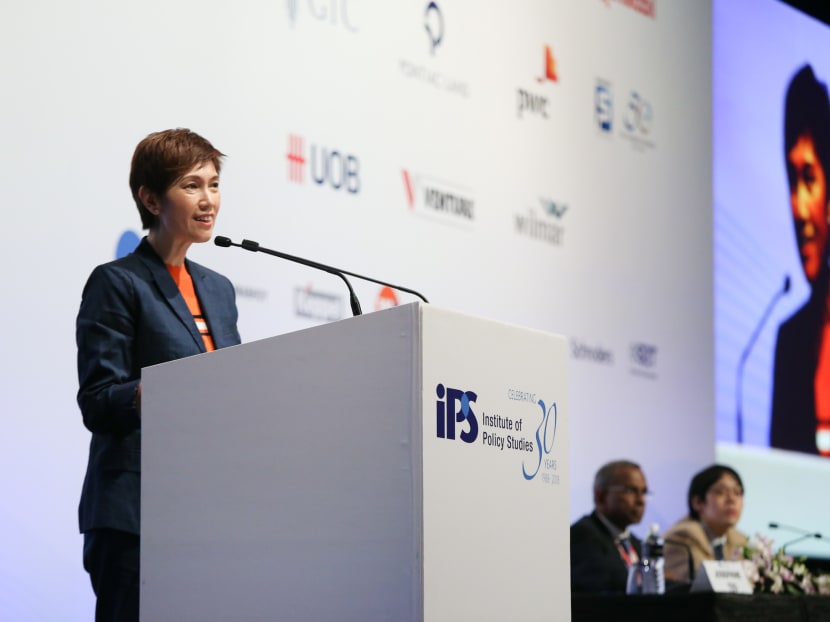Slowing down economic growth makes everyone ‘worse off’, won’t reduce inequality: Teo
SINGAPORE — Manpower Minister Josephine Teo said on Friday that while some quarters have criticised Singapore for growing “at all costs” and worsening inequality as a result, slowing down economic growth will instead make everyone “worse off” and deal the hardest blow to those at the bottom.

Manpower Minister Josephine Teo at a panel discussion on the factors that create class disparities in society. It was part of a conference to mark the Institute of Policy Studies' 30th anniversary.
SINGAPORE — Manpower Minister Josephine Teo said on Friday that while some quarters have criticised Singapore for growing “at all costs” and worsening inequality as a result, slowing down economic growth will instead make everyone “worse off” and deal the hardest blow to those at the bottom.
“Going slow will not reduce inequality… Jobs will be lost and incomes will fall for those at the lower end of the workforce, while at the top end, those with the talent or entrepreneurial ability to seize opportunities elsewhere will up and go,” Mrs Teo said on Friday (Oct 26) at a panel discussion on the factors that create class disparities in society.
The discussion, chaired by adjunct senior research fellow Manu Bhaskaran from the Institute of Policy Studies (IPS), also featured economist and Nominated Member of Parliament (NMP) Walter Theseira. It was part of a conference to mark the thinktank's 30th anniversary.
Mrs Teo said that slow growth will not assure Singapore of a more equal society, so long as the world remains a globalised one.
To tackle inequality, the Government intervenes actively to offer extra support to students facing financial difficulties, she added. This is done through heavy subsidies in education and extra support for children from lower-income families, for instance.
Beyond support for education, the Government also supplements incomes through the Workfare Income Supplement scheme, which provides support to the bottom 20 per cent of workers.
On the plight of the poor, Associate Professor Theseira, who is with the Singapore University of Social Sciences, said that this group has a lower capacity for the “everyday mistakes” that most well-provided-for Singaporeans make.
The poor also faces higher levels of stress and overload from the weight of everyday events. He used the example of conference participants at the Sands Expo and Convention Centre forgetting to use a coupon that gives them free parking. He said for most in the audience, this lapse of judgement would not be a life-changing moment. But for the poor, an error like this would wipe out half their daily wage, and they may have to skip a meal.
DISRUPTED JOBS: CHALLENGE IS TO NUDGE PEOPLE TO TRANSIT
Asked about how government interventions should shift given that technology is disrupting jobs, Mrs Teo said workers must take advantage of the possibilities offered by new technology to acquire new skills, which could also lift their wages.
And while some jobs are disrupted, there are “high-touch” jobs in areas such as healthcare and childcare, she said, and workers need to be nudged towards these growth areas.
Still, Assoc Prof Theseira said that the question is how to get workers to adapt to these new jobs. The difficulty is that most workers have their own ideas of the value of jobs and find it hard to change what they do.
Turning to calls from some quarters for a minimum-wage model, Mrs Teo said that these have to be carefully thought through.
A minimum wage, to be meaningful, must force employers to fork out more than the market rate for some types of workers. It will have the same effect as a “tax” on employment.
Workers with the lowest wages would attract the highest “tax”, and some employers may be reluctant to hire workers at this rate, leading to lower employment levels.
This could also cause workers to work illegally below the minimum wage, making them more vulnerable.
Assoc Prof Theseira agreed that a large and binding minimum wage could have an undesirable effect on the labour market, but he said that calibrated minimum wages could fulfil the same role as unions, in that they help address the asymmetries between workers and employers. Many workers are not aware of their rights and have limited bargaining power, he added.
DON'T EXPECT EVERY BOX TO BE TICKED
Taking a question from sociologist Paulin Straughan of the Singapore Management University, who asked about markers other than educational achievement that employers can use in seeking talent, Mrs Teo said that some employers now expect a “100 per cent job fit” and every box to be ticked before they are prepared to hire a worker.
Educational qualification, however, is just one marker suggesting job fit. She urged employers to give people who do not have the skill set of a well-educated individual a shot.
Assoc Prof Theseira said that the Government has led the way by putting graduates and diploma holders on the same scheme, but there remains a need to do more, as there is still the perception of a “scholar and non-scholar” gap.








